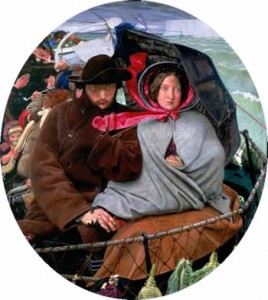
The Last of England by Ford Madox Brown
Over the centuries, the English have often emigrated to foreign parts, in particular the United States of America, or to Australia. Many people who live in America or Australia will find that they have English ancestors, perhaps within the last century, or perhaps further back. For example, many Australians find that their ancestors were transported as convicts in the late 18th and early 19th centuries. Or perhaps they were even the early settlers in the New World of America in the 1600s.
Researching your family in a different country can be challenging. First of all, you need to find out, if possible, where they actually came from in England. The point of departure on an immigration record is not usually going to be enough. If you can, you need to find all the records you can in your country first, to see if you can get any clues as to where the family were living in England.
An exception to this would be if your immigrant ancestor’s name was so unusual that it can be easily found in the English records!
If you need help with your English ancestry, email me on rosbott59@gmail.com for details of my research service. Or, if you prefer to carry out your own research, read on.
Once you have an idea of whereabouts in England they came from, you will need to familiarise yourself with the kinds of records you will need for the time period they lived in, and where you can find them. If you have been using Ancestry.com for your research so far, you will need to widen your subscription to include records on Ancestry.co.uk. Make sure you familiarise yourself with exactly what records are covered on sites such as Ancestry, FamilySearch and FindMyPast. Not all parish records, or other records, are covered online, and this is definitely something you need to know!
Once you start your research, it is also very useful to find out more about the geographical area they lived in. Awareness of the nearby villages and towns, and also the types of occupations available in the locality, will help with your research and give you a deeper understanding of your ancestors’ movements and motives. Keeping Google maps open on a browser while you are researching is usually very useful if you need to see the proximity of parishes where a possible ancestor may have been born or married in, before moving to a place nearby.
The English census records back to 1851 are extremely useful for finding exact places of birth, and the 1841 census can tell you whether or not they were born in the same county, but before that, things can get very tricky if your ancestors moved around a lot. If you’re having difficulty finding them in the parish records, other English records may need to be consulted. For the wealthier ancestors, probate and land records can prove extremely useful in providing family relationships, but for the poorer families, sometimes apprenticeship records, poor law records, or even criminal records can provide clues to origins. The National Archives website provides a very good search service where you can find out if there are any records available for a particular name, either online, at the National Archives, or at a local county record office.
If you do get stuck, then it may well be worth while employing the services of a local professional. A genealogist who is based in England will have a deeper knowledge and understanding of local records, as well as some expertise in the history and geography of the local area, and the country as a whole.
My own services cover most of England and Wales, and also Scotland and Ireland (with limitations). However, if I need access to local areas that are out of my reach, I will sub-hire a local genealogist on your behalf. Email me at rosbott59@gmail.com to find out more.
Alternatively, you can find a genealogist for your area on the Members page of the Association of Genealogists and Research Agents (AGRA).
You might also be interested to know that I have a Beginner’s Course in UK Ancestry available at Udemy.com. This course is mainly for people who are completely new to genealogy, but it would also be useful for anyone starting to trace English ancestry for the first time.

